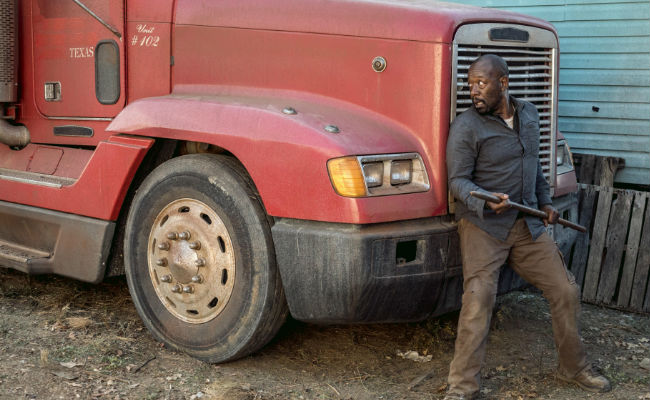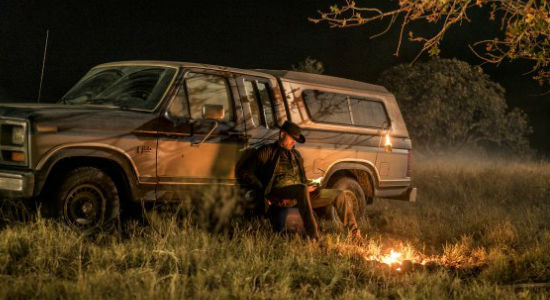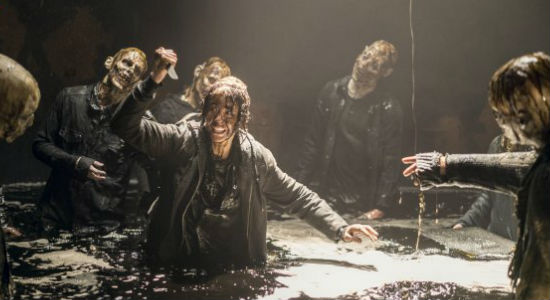
- SPOILERS AHEAD … AND FRIENDS AND ENEMIES AND FRENEMIES, AND OF COURSE, ZOMBIES …
AMC, it turns out, isn’t all that well practised at heeding proverbs.
Fair enough in one sense – what was in vogue a couple of millennia ago, so much so that the Bible decided a whole book of the instructional words of life made a fitting addition to canon, is not really in the running in the age of self-actualisation and digital homilies.
And yet, you can’t helping feeling that someone at AMC HQ, in fact the whole damn production team, might not have benefited from heeding the words of that age-old proverb, “If it ain’t broke, don’t fix it”, especially when it comes to one of its key shows, Fear the Walking Dead.
The progeny of once-might rating juggernaut, The Walking Dead, which has just limped into the muted sunset of a lacklustre season 8 finale which was neither vacuously violent nor intelligently or emotionally meaningful, Fear hummed along quite nicely for three meditatively-immersive seasons.
It might not have got everything right, but in its mix of raw, honestly-expressed humanity, slowly-unfolding civilisational collapse and visceral storytelling, where real people reacted in ways that we could identify with and understand (as opposed to becoming self-righteous serial killers – et tu Rick?), it stood starkly apart from its dithering, narratively-lost parent in ways that really hit home episode after episode.
In sassy matriarch Madison (Kim Dickens), kids Alicia (Alycia Debnam-Carey) and Nick (Frank Dillane), and even self-interested Victor (Colman Domingo) we saw people whose decisions, although far from perfect, made sense to viewers who, brave words aside, have, if they are honest with themselves, seriously no sense about what they’d really do should the zombie apocalypse ever really come a-calling.
Would you be cunningly self-preservational? Humane and inclusive? Bitter and depressed? Violently aggressive and angry? Impossible to tell until it happened, and here’s to such imaginative end-of-the-world-ness never being made decayed flesh, but in the main cast, and many of its passing characters, we saw people who moved from the early days of the fall of humanity into its darkest annals, simply doing the best they could.
And behold, it was very , very good.

Funny thing though, and let’s be honest here, it was not even remotely worth a titter or a giggle, let alone a guffaw, AMC didn’t really see it that way.
What they seemed to see, and quite a number of rusted-on The Walking Dead were more than happy to trollingly join their addled Greek chorus, was a broken show, a spin-off that limped in the ratings, eschewing sensational plot arcs and wantonly manipulative character deaths, though it did succumb to both a little at times, in favour of slowly and carefully documenting the downfall of once great and mighty Homo Sapiens.
In terrifying real time we witnessed each death, each loss of comfort, of security, of inner morality and ethical outlook, all of them chipping away a little more at the civilisational sheen we all like to wear to feel better about ourselves.
Little by little, Fear the Walking Dead peeled that away, exposing hitherto unknown (if fleeting) humanity in self-preservational people like Victor while driving others like Madison, who managed to bring down an entire survivalist cult in her wake, to commit once completely unthinkable acts.
It was gloriously, slow-burningly authentic, striking at the heart of our grand delusions and self-justifications about pretty much everything, a morality tale writ large that, because it kicked off at the very start of the zombie apocalypse, felt far closer to home than even The Walking Dead.
Somewhere somehow the parent show lost its way, drained of meaning and purpose in favour of schlock narrative sleights of hand and repetitive good vs evil where the lines blurred so badly that everyone ended up rank and unlikable.
But Fear the Walking Dead kept its soul, refusing to sign it over to the ratings devil – no one’s saying at this point that ratings don’t matter but if keeping them means gutting everything you’ve created, then something is clearly very wrong, a case of the ratings tail wagging the creative dog – and benefited from balancing the imperiling of everyone in the show at their own hands and that of the undead with careful, nuanced storytelling that hit you in the heart because it felt like it could happen.
No one wanted it to, of course, since (a) running for your life is nowhere near as much fun as Netflix-and-chill-ing and (b) its far better to live out your disaster porn fantasies in a fictional setting than for real, but if it does come to pass, then Fear felt like it gave us a fairly good idea of how it might all go down.
Not gilded, not overdone, not stupidly videogame violent or sensationally vacuous; just real people in fantastical situations doing their best to muddle their way through.

Yet, for all that, for all its relative non-brokenness, its mainly whole narrative slow-burns and revelatory character studies, Fear the Walking Dead has been “fixed”, given an overhaul when one was not even remotely needed.
This unnecessary overhaul, this re-decorating of the show’s look and feel, and narrative core, the product you suspect of new showrunners Andrew Chambliss and Ian Goldberg and transplanted executive producer Scott M. Gimple, looked egregiously opportunistic, something noticed not just by yours truly.
This episode is literally just an audience grab for FTWD. They’re taking a liked character from TWD and dedicating a whole episode to him just to try to get TWD fans to watch ? Meanwhile I’m over here bored to death and waiting for the Clarks and Strand to show up #FearTWD
— Rachel (@BendItLikeTobin) April 16, 2018
Or try this tweet on for size …
Watch fear they said, itll be better they said. Morgan becomes part of the show they said. But instead Morgan seems to be the WHOLE SHOW ????♀️ #FearTWD
— Bree Curtis ? (@breecurti) April 16, 2018
Season 4’s return wasn’t completely botched, of course, with new characters, likeable loner John Dorie (Garret Dillahunt) and journalist Althea (Maggie Grace) coming across as real people who had somehow found a way to keep their humanity largely intact.
In this fast-forwarded, time-jump-heavy iteration of Fear the Walking Dead, quick-marched to the present day of the apocalypse, the better to pointlessly shoehorn Morgan into its unbroken narrative, the new characters worked well, making sense with their mix of accommodation to the darkness and unwillingness to let it swallow them whole.
But for all the time on spent on these people, and the seemingly unending (and occasionally poetic) introduction of Morgan to the now-unrecognisable world of Fear in a slow, moody montage that feel a The Walking Dead-lite sequel to the that show’s largely inert, directionless and faux-meaningful eighth season, you were left wondering what the hell had happened to Madison, Alicia, Nick and Victor and why Fear the Walking Dead no longer looked like the show we had once loved.
Sure we saw our favourite zombie survivors at the very end, playing a con’s game of done-over survivor who tricks Morgan, John and Althea with her whispered trauma of “There are bad people out here”, but they made no sense, raw, dark and twisted in ways that made no sense and felt alienating.
Perhaps it will all work itself out in next week’s “Another Day in the Diamond”, and we’ll begin to pivot back to the show we know and love – just for the record, I am not averse to shows growing and developing; in fact it’s something I crave but this week’s episode was less evolution than wholesale butchering of a once-vital and engaging premise – but right now, it feels like the zombies, of which there were plenty this episode, weren’t the only dead things shuffling across our screen.